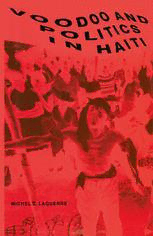
Voodoo and Politics in Haiti PDF
Preview Voodoo and Politics in Haiti
VOODOO AND POLITICS IN HAITI Also by Michel S. Laguerre ETUDES SUR LE VODOU HAITIEN VOODOO HERITAGE THE COMPLETE HAITIANA: A Bibliographie Guide to the Seholarly Literature, 1900-1980 URBAN LIFE IN THE CARIBBEAN: A Study of a Haitian Urban Community AMERICAN ODYSSEY: Haitians in New York City AFRO-CARIBBEAN FOLK MEDICINE: The Reproduetion and Praetiee of Healing Voodoo and Politics in Haiti s. Michel Laguerre Associate Professor of Caribbean Affairs University of California at Berkeley Palgrave Macmillan ISBN 978-1-349-19922-8 ISBN 978-1-349-19920-4 (eBook) DOI 10.1007/978-1-349-19920-4 © Michel S. Laguerre, 1989 Softcover reprint of the hardcover 1s t edition 1989 978-0-333-46852-4 All rights reserved. For information, write: Scholarly and Reference Division, St. Martin's Press, Inc., 175 Fifth Avenue, New York, N.Y. 10010 First published in the United States of America in 1989 ISBN 978-0-312-02066-8 Library of Congress Cataloging-in-Publication Data Laguerre, Michel S. Voodoo and politics in Haiti. Bibliography: p. IncIudes index. 1. Voodooism-Haiti. 2. Religion and politics Haiti. 3. Haiti-Religion. 4. Haiti-Politics and government. I. Title. BL2490.L26 1989 299'.67 88-18181 ISBN 978-0-312-02066-8 To Joujou, Lily and Agathe Contents List o[ Illustrations ix Introduction 1 1 Religion and Politics 7 Integrative and Disruptive Role of Religion in Society 11 State-Church Relationships 17 Voodoo and Politics 18 2 The Evolution of Colonial Voodoo 22 From African to Slave Religions 23 Formation of Voodoo Cults 26 Development of Voodoo Cults 28 Explosion of Voodoo Cells 33 Religious Acculturation of the Slaves 34 Summary 37 3 Marronage and Voodoo 39 Rural Marronage 40 Urban Marronage 44 Nomadic Marronage 45 Size and Establishment of Maroon Communities 46 Maroon Political Systems 47 Economic Organisation 49 Other Aspects of Social Life 50 Marronage and Voodoo 51 Summary 54 4 Revolutionary Voodoo Leaders 56 Voodoo, the Secret Religion of the Slaves 56 Colonial Administration Against Voodoo 58 The Use of Voodoo in Liberation Struggles 60 Conclusion 67 5 Secret Societies 71 The Functioning of a Secret Society 73 Evening Rallies 76 From Maroon Communities to Bizango Secret Society 79 Conclusion 81 vii Vlll Contents 6 Pilgrimage, Voodoo and Politics 82 The Village 84 The Development of Saut D'Eau as a Pilgrimage Centre 86 The Pilgrims 90 Folk Christianity and Voodoo Practices 93 Use of the Holy Virgin's Apparitions in Haitian Politics 97 Pilgrimage and the Maintenance of Social Order 98 Conclusion 100 7 Politics and Voodoo During the Duvalier Era 101 Fran~ois Duvalier and the Griots Group 103 Voodoo and Electoral Politics 104 The Voodooisation of Haitian Politics 107 The Politicisation of Haitian Voodoo 115 Conclusion 118 8 Public Policies and National Prospects 121 The Government of God 122 Voodoo Space 124 Public Policy 125 Notes and References 129 Bibliography 136 Index 147 List of Illustrations 1 Model I: Independent Temples 110 2 Model 11: Temples with Symmetrical Relationships 111 3 Model 111: Temples with Common Ownership 112 4 Model IV: Temples with Asymmetrical Relationships 113 5 Model V: Temples with Satellite and Subsatellite Relationships 114 ix Introduction This book, which explains the intricate relationship between Voodoo and politics in Haiti from the colonial period to the present, is part of my ongoing research into the functioning of Caribbean political and urban institutions. When the country achieved its independence in 1804, the majority of its political leaders and army offkers and soldiers were still Voodoo practitioners. Although the first constitution proclaimed the Catholic church the official church of the new republic, it remains true that the Voodoo faith could not and did not evaporate overnight, partly because of the strategic, religious and ideological role it played during the Haitian revolution. Voodoo is found to be an ingredient of so me weight in the nascent formation and development of post-independence Haitian political process. The itinerary or trajectory of this functional but informal marriage between Voodoo and politics is here expounded. Ever since the colonial era, the Voodoo church has been an underground political institution in Haiti and the Voodoo priest a political middleman. In fact, the active participation of Voodoo leaders in the Haitian revolution was of critical importance to the early independence of the colony in 1804. On 14 August 1791, a slave and Voodoo priest named Boukman organised a mammoth Voodoo ceremony on one of the northern plantations. During a possession trance, he informed his brethren and associates that the Voodoo spirits wanted their help in eliminating the French from the colony and liberating the slaves. The slave rebellion that followed was headed by several Voodoo priests and maroon - fugitive slave - leaders in various parts of the colony. After independence, in order to protect their freedom and their land, former slaves and maroons congregated in secret societies around inftuential Voodoo priests. Throughout the nineteenth century they participated in and organised peasant revolts against the appro priation of their land by inftuential politicians and army officers. One must also add that they served at times as back-up paramilitary units to the regular army when the country was in astate of alert - both to resist an imminent foreign invasion, and to undertake the invasions of the Dominican Republic. During the US occupation, 1915-34, their existence was made known through their participation in the 'Kako' resistance movement. They launched large-scale guerilla 1
